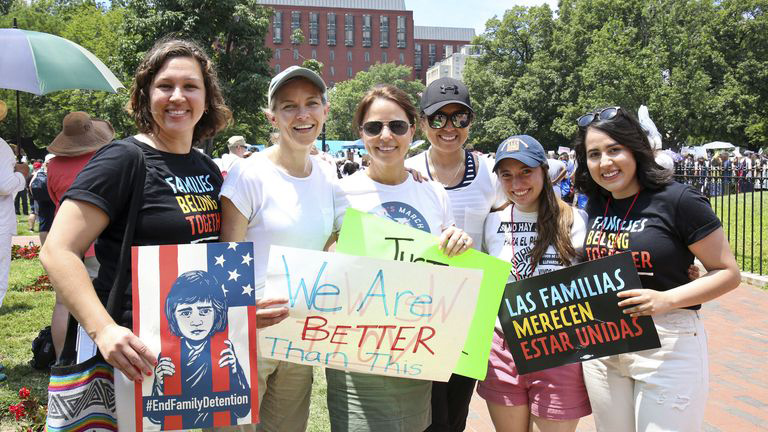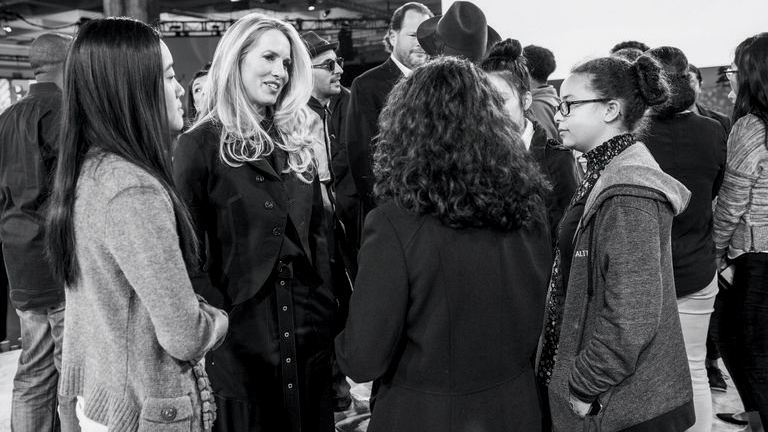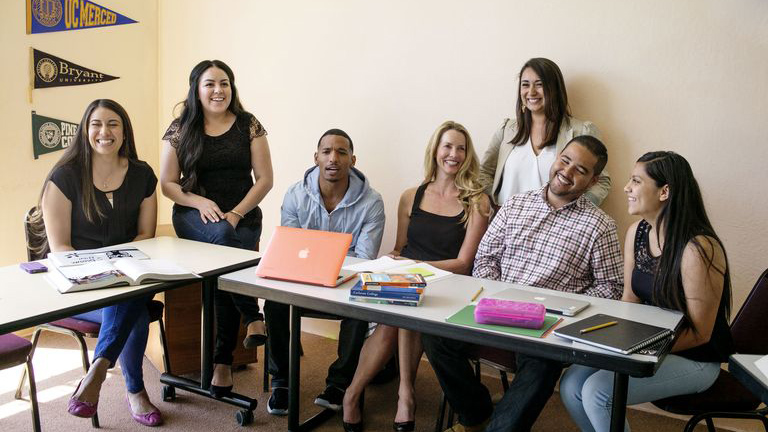The Welcome Committee
A group of women at Emerson Collective, led by Laurene Powell Jobs, are on a mission to fix how America treats immigrants.

Within the earliest moments of Carne y Arena, the Oscar-winning virtual reality film based on immigrants' true accounts of traveling to the U.S., a border patrol officer shines his flashlight in your eyes and commands you to drop to the ground. In the immersive experience, you're not a bystander watching a documentary. You inhabit the story. And that’s exactly what the installation’s primary sponsor, Emerson Collective, wants you to do.
Emerson Collective may be the most powerful impact organization you’ve never heard of, particularly given that Laurene Powell Jobs, its president and founder, was married to Steve Jobs until his death in 2011. At the time of this writing, Emerson Collective—named after transcendentalist writer Ralph Waldo Emerson—has granted a profile interview to only one other media outlet this year, and the employees interviewed for this article have never spoken publicly about their work. Since its inception in 2004, Emerson Collective, which has more than 130 employees—mostly based in California, Chicago, and Washington, D.C.—and is focused on immigration, education, climate change, gun-violence prevention, social justice, and cancer research, has operated as anonymously as possible.
But the Trump administration’s escalating siege on immigration rights has increased the urgency to make immigrants’ voices heard—and that’s one of the issues closest to Powell Jobs’s heart. “At this point, our preference for working diligently under the radar is less important than having people understand the human nature of hateful, demonizing rhetoric,” Powell Jobs tells me the day after the U.S. Supreme Court upheld President Donald Trump’s travel ban in late June.
Policies that are true assaults on immigrants have become weaponized as a political tool.
Powell Jobs, 54, became interested in helping immigrants long before the current zeitgeist. In the late 1990s, when she tutored Bay Area students in her spare time, she was inspired to cofound College Track, a program that supports and follows underserved students from high school through college. When the program’s first class applied to college, Powell Jobs learned that those who lacked legal immigration status faced severe restrictions, such as an inability to access state or federal education funding.
Since then, her education work has informed her immigration work, and vice versa. Through the Dreamer students, “I started understanding much more deeply how profound the need for comprehensive immigration reform is in America. Over the last decade and a half, the work has scoped out to support policies that are more inclusive and programs at local and state levels that expand access, like legal services and in-state tuition for Dreamers,” Powell Jobs says. “Also, now we address the issues around the practices of this administration that have escalated cruel and counterproductive treatment of individuals. Policies that are true assaults on immigrants have become weaponized as a political tool.”

Emerson Collective employees Monica Barrera, Anya McMurray, Tyler Moran, Beatriz Lopez, Cristina Moreno, and Sara Gomez Horta at the Families Belong Together March on June 30 in D.C.
Emerson’s immigration team utilizes a multipronged strategy to expand immigrant rights. There’s a grant funding arm, which also houses a Silicon Valley–style incubator, run by immigration lawyer Kavitha Sreeharsha, 45, that deploys technologies to help undocumented immigrants and their families, like an app for lawyers unfamiliar with immigration law. The Immigration Hub, led by former White House immigration deputy policy director Tyler Moran, 48, handles federal legislation efforts, including daily work with Congress, policy analysis, and lobbying. Broader strategy efforts, working in cultural, artistic, and communications spaces to, in Emerson lingo, “move hearts and minds,” are spearheaded by Anya McMurray, a former public defender who served as deputy general counsel of the Senate Judiciary Committee. Each branch of the 13-person immigration team—12 of whom are women, nine of them of color, many with personal connections to the issues—weaves pro-immigration groups and individuals from various sectors (medical, legal, cultural, the arts) into the same network, creating likely and unlikely partnerships.
Under this administration, every day you ask, ‘What can I do?’ I’m Latina. I feel attacked.
McMurray, 44, leads me through Emerson’s D.C. office, an anonymous converted warehouse surrounded by forklifts hauling crates of produce. Inside the airy two-story building, we pass several cozy common areas, including an open dining space with an electric egg cooker. Whoever arrives first in the morning puts eggs in the device and fresh fruit on the table.
Get exclusive access to fashion and beauty trends, hot-off-the-press celebrity news, and more.
The looseness of the hierarchy leads to spontaneous brainstorming sessions in those common areas. “We aren’t constrained by ‘Is that in the mission plan?’ ‘Is that in the org-chart structure?’ When you put bright, motivated, compassionate people together and give them that space, you get really interesting ideas,” McMurray says. Take Emerson Collective fellow Paola Ramos, 31. “Under this administration, every day you ask, ‘What can I do?’ I’m Latina. I feel attacked; my undocumented friends feel attacked,” she says just before hopping on a flight to the Texas border. Ramos plans to volunteer at a detention center by playing with the children, translating for Spanish speakers, and helping families however she can. While her visit isn’t on behalf of Emerson, her on-the-ground observations will inform her community outreach work. “For me to see Laurene coming up with creative ways to empower people gives me hope.”

Powell Jobs (second from left) talks to College Track students at the 2017 Dreamforce Conference in San Francisco. She founded the program in the 1990s to support underserved communities.
Emerson couples its long view with rapid responses to tackle the urgent daily battles immigrants face. It funds cultural awareness projects such as Carne y Arena, directed by Alejandro G. Iñárritu and currently on exhibit in Washington, D.C., that places viewers in the shoes of an immigrant crossing—and being apprehended at—the U.S.–Mexico border. It supports programs on the front lines of current crises by providing refugee assistance, education, and advocacy. And it engages with several groups across the ideological spectrum to discuss immigration policy in social-media communities and elsewhere. “There’s room for people to disagree, but it’s taking some of the oxygen out of hate,” McMurray says of those social channels.
In the last 14 months, Emerson has purchased a majority stake in The Atlantic, and Powell Jobs has invested hundreds of millions of dollars in the company that owns the Washington Wizards, Capitals, and Mystics. Powell Jobs did not discuss how these projects relate to her overall planning, but she says that Emerson’s mission remains focused on comprehensive immigration reform. “That’s why we built out all the tools in our tool kit for storytelling, why we’re using arts and culture and a communications strategy, because this goes beyond politics and a legal strategy and moves into American culture and identity.”
Emerson aims to connect people in a way that rises above politics, whether by spreading immigrants’ voices or explaining the truths about executive orders. For example, Emerson partnered with Oscar-winning documentarian Davis Guggenheim to follow four undocumented Dreamers in the 2013 film The Dream Is Now. Emerson also collaborates with French artist JR, who installs artwork at the U.S.–Mexican border illustrating that humanity transcends walls.
“Everything built over the last administration is systematically being torn down, so we’re doing our best to hold the line as much as possible and do work on the narrative,” the Immigration Hub’s Moran says. “Storytelling is really important because immigration is so highly politicized. If you can tap into commonality, maybe there’s a better shot of depoliticizing this issue. The more we can tell the personal stories, I hope we’ll be able to neutralize some of the anti-immigrant attacks.”

Powell Jobs (center) with 2015 College Track scholars.
It can be difficult to concentrate one’s sights on the big picture when the fights of the moment are so immediate and the consequences so significant. “We are just whiplashed, as caring individuals, from the long-term focus,” Powell Jobs says. “We are getting hit left and right with much more chaos throughout the system than anybody expected. The volume and the velocity have been a little overwhelming. To then advocate for comprehensive immigration reform is very difficult when we’re faced with children who have been ripped from their parents’ arms. Sometimes the crisis of the moment demands the attention. Then we will always be ready to pivot when the opportunity comes forward for reasonable people to say, ‘Let’s actually look for a long-term fix to this problem.’ We work on issues that are complicated and generally systemic, with no easy fix. And so we bring a mind-set of digging in for the long term. We know this is decades-long work.”
As Emerson attempts to reduce the hostility from the right, it also looks for ways to increase the Left’s depth of commitment and primacy of immigration issues. At press time, the White House was waffling between the terms “family separation” and “family detention” for what Powell Jobs calls “family internment camps.” McMurray says, “I know we’re not going to solve the problem now. But going to communities, seeing other people engaging in conversation, you see the humanity. That’s Social Change 101: helping people empathize with others and find a shared sense of future."
Indeed, in Carne y Arena, with the power of VR technology, you can step into the bodies of the virtual immigrants, whether the middle-aged woman or the four-year-old boy. When you do so, you see and hear only their beating hearts. And if you are still, your own heartbeat aligns. The moment is a striking embodiment of Emerson’s mission: trying to reach people, one at a time or community by community, to show them that, ultimately, our stories are the same.
Emerson Collective Employees on Why They Do What They Do:
"Women and children who are undocumented are exceptionally vulnerable, both to acts of violence and to the repercussions of a system that fails to protect them. Early in my career as a lawyer defending immigrant victims of crime, I met countless women too afraid to seek the protection of the police—the risk of deportation and separation from their families was too high. Without help, they and their children would have continued to suffer violence and unimaginable harm. Today, undocumented families are more fearful of police and deportation. Families who enter the U.S. to flee violence and seek protection are criminalized, traumatized, and dehumanized. Until immigrant families can feel safe in the U.S., our work must continue."
"Recently while in the Rio Grande Valley, I met Sister Norma Pimental at a crisis center she runs to support families just released from detention. Witnessing the trauma suffered by these families—many of whom had been caged in freezing rooms for days—it’s easy to feel helpless. Yet as I caught glimpses of Sister Norma’s work, I was reminded that the best solution to hate actually lies in our own hands: acts of kindness. She welcomed migrants with a hot dish, a warm shower, a new set of clothes, and the dignity that each and every human being deserves. Sister Norma reminded me that we all hold that power."
"As a first-generation American who grew up 20 miles from the U.S.-Mexico border, I refuse to let my 17-month-old son grow up in a country clouded by the bigotry and racism percolating throughout the nation. I want to pass along a legacy that honors the strength and pride of the immigrants in his bloodline, including my son's father, who immigrated to the U.S. from Colombia as a political asylee; my own father, who immigrated to the U.S. from Mexico following my abuelo's arrival as a "bracero" agricultural guest worker; and my great-grandmother on my mother's side, who came to the U.S. in the 1800s fleeing economic devastation in Ireland. My son inherited a rich history of resilience in the face of adversity. Our communities are defined not by walls and immigration statuses, but by the core values of dignity, perseverance, and unbreakable family bonds. That’s what gives me hope."
This article originally appeared in the September 2018 issue of Marie Claire.